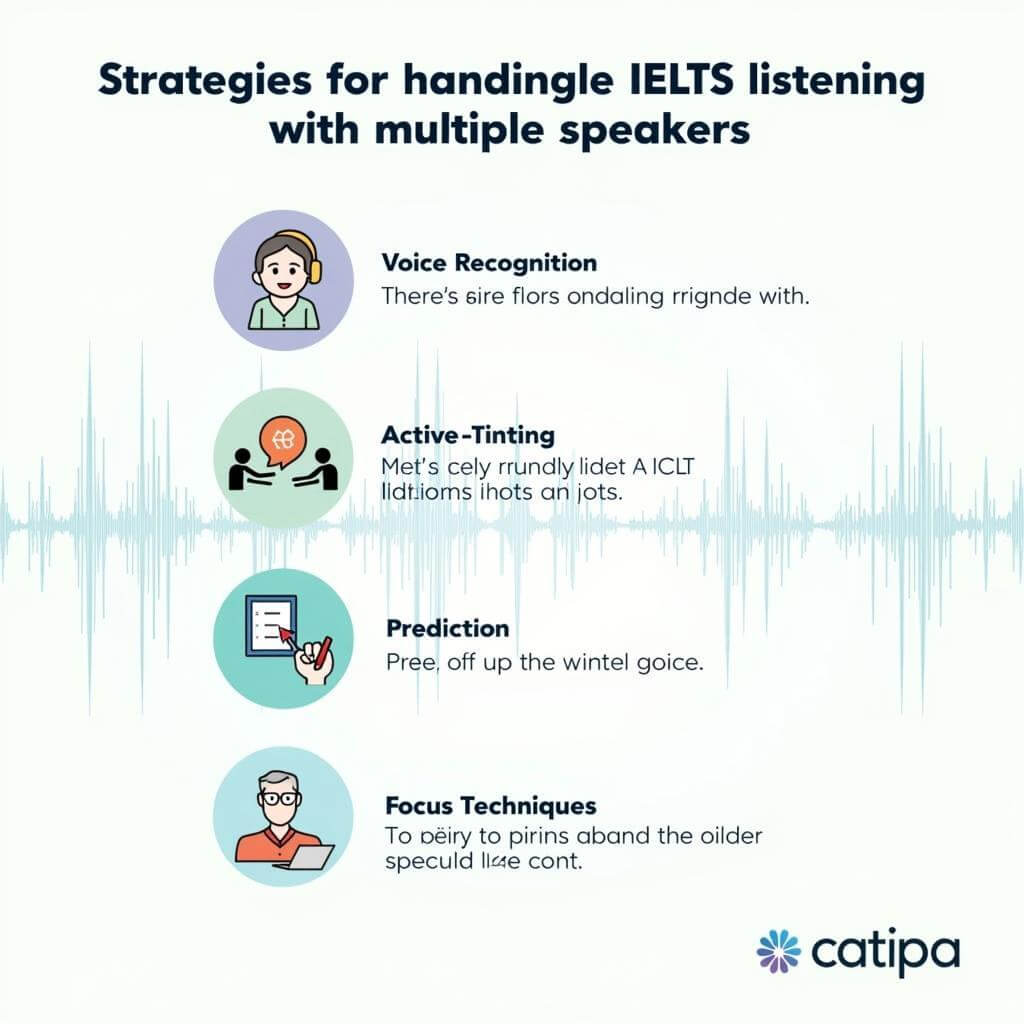The IELTS Listening test often presents challenges, particularly when it comes to sections featuring multiple speakers. This aspect of the exam can be daunting for many test-takers, but with the right approach, it’s possible to excel. As an experienced IELTS instructor, I’ll share valuable insights on how to effectively navigate this crucial component of the listening test.
Understanding the Challenge of Multiple Speakers
When faced with multiple speakers in the IELTS Listening test, candidates often struggle to distinguish between different voices, follow the conversation flow, and identify key information. This complexity is intentionally designed to assess your ability to comprehend real-life situations where multiple people are involved in a discussion.
Improving listening accuracy naturally is essential for mastering this skill. By exposing yourself to various accents and conversation styles, you’ll develop a more intuitive understanding of multi-speaker dialogues.
Key Strategies for Success
1. Voice Recognition
One of the fundamental skills in handling multiple speakers is the ability to distinguish between different voices. Here are some techniques to improve your voice recognition:
- Pay attention to pitch, tone, and speaking speed
- Listen for unique speech patterns or verbal tics
- Note any accent differences between speakers
2. Active Listening Techniques
Employing active listening strategies can significantly enhance your comprehension:
- Focus on the overall context of the conversation
- Anticipate potential questions based on the topic
- Listen for transition words that indicate a change in speaker or topic
3. Note-Taking Skills
Effective note-taking is crucial when dealing with multiple speakers. Consider these tips:
- Use abbreviations and symbols to save time
- Organize notes by speaker (e.g., use different columns for each voice)
- Highlight key information and potential answers
Improving listening for section 3 of the IELTS test, which often features multiple speakers, requires refined note-taking skills and active engagement with the audio.
4. Predict and Prepare
Anticipating the content and structure of the conversation can give you a significant advantage:
- Read the questions beforehand to know what information to listen for
- Predict potential topics and vocabulary based on the context provided
- Mentally prepare for rapid switches between speakers
5. Stay Focused
Maintaining concentration throughout the listening section is vital:
- Practice mindfulness techniques to enhance focus
- Avoid getting stuck on missed information; move on quickly
- Use physical cues (e.g., following the text with your finger) to stay engaged
Staying focused under pressure is a skill that can be developed with practice and the right mindset.

Common Pitfalls to Avoid
When dealing with multiple speakers in IELTS Listening, be aware of these potential mistakes:
- Confusing speakers: Don’t assume a particular answer belongs to a specific speaker without clear evidence.
- Missing contextual clues: Pay attention to introductions and role descriptions that can help identify speakers.
- Overlooking non-verbal cues: In video-based questions, visual cues can provide valuable information about speaker changes.
- Fixating on accents: While accents are important, don’t let unfamiliar ones distract you from the content.
- Neglecting question types: Different question formats may require varying approaches to multiple-speaker sections.
Practical Exercises for Improvement
To enhance your skills in handling multiple speakers, try these exercises:
- Listen to podcasts or radio shows featuring panel discussions
- Watch debate programs and practice summarizing different speakers’ points
- Engage in group conversations and practice active listening techniques
- Use IELTS practice tests with a focus on multiple-speaker sections
- Record and analyze your own group discussions to understand speaker dynamics
Handling fast-paced audio sections is particularly important when multiple speakers are involved, as the pace of conversation can often increase.
Applying Skills to IELTS Listening Test Sections
Understanding how to apply these skills to specific parts of the IELTS Listening test is crucial:
Section 1: Everyday Social Contexts
- Usually features two speakers in a transactional dialogue
- Focus on identifying specific details like names, numbers, and dates
- Practice with role-play scenarios to simulate real-life conversations
Section 2: Everyday Social Contexts
- Typically a monologue, but may include brief interactions with another speaker
- Concentrate on the main speaker while noting any interjections or questions from others
- Improve your skills in strategies for tackling long monologues in IELTS listening to prepare for this section
Section 3: Educational or Training Contexts
- Often involves multiple speakers in an academic discussion
- Pay attention to different viewpoints and how they relate to each other
- Practice with academic debates and group project discussions
Section 4: Academic Lecture
- Usually a single speaker, but may include audience interaction
- Focus on the main ideas and supporting details presented by the lecturer
- Prepare by listening to academic lectures and TED Talks
Conclusion
Mastering the skill of handling multiple speakers in IELTS Listening is a significant step towards achieving a high band score. By implementing the strategies and exercises outlined in this guide, you can dramatically improve your performance in this challenging aspect of the test. Remember, consistent practice and exposure to various English accents and conversation styles are key to success. Stay focused, remain confident, and approach each listening task with a strategic mindset. With dedication and the right techniques, you’ll be well-equipped to tackle any multiple-speaker scenario in your IELTS Listening test.